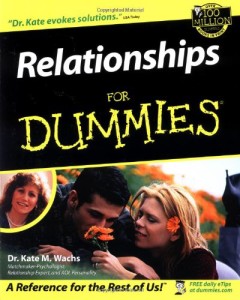by Dr. Kate Wachs. 2002.
Table of Contents
Part I: Relationships 101
1. Is it a good relationship or not?
2. Taking a ride on the cycle of love
3. Is it a match?
4. What makes someone compatible?
5. Finding that special someone
Part II: Getting Closer
6. Growing more intimate
7. Sex early in the relationship
8. When and why to talk exclusivity
9. Is it time to cohabit?
Part III: Staying in love –psychological and emotional intimacy
10. Come on, get happy!
11. Superglue number one: good communication – the nuts
12. Good communication: the bolts
13. Good communication: putting it all together
Part IV: Feeding the flame – physical and sexual intimacy
14. Sexual baloney
15. Superglue number two: good sex!
16. Light that fire!
Part V: Moving Forward Together
17. Marriage: the magic wand?
18. Move forward to marriage?
19. Mmmmmarriage: the M word
20. Relationship Rx
Part VI: Moving Forward Separately
21. Breaking up with less pain
22. Starting over
Part VII: The Part of Tens
23. 10+1 tips to successfully pace a new relationship
24. 10 ways to rekindle your flame
Appendix A: the Dr. Kate Compatibility Quiz
Appendix B: the Dr. Kate Communication Quiz
Chapter 6: Growing More Intimate
Myth #1: if some is good, more must be heaven
Many people believe that when it comes to relationships, if some is good then more must be even better. For example, if someone likes some of your company and you get along superbly during that time, then naturally, that person would enjoy more of your company.
The reality is, however that less can be more–especially in the beginning of a relationship.
It’s better to leave someone wanting more of you and fantasizing about “the next time,” than to overstay your welcome and bore him or her silly. Relationships are enormously fragile in the beginning stages, and excitement is an important part of The Infatuation Stage in any relationship. If you vow to stay until the time you spend together is no longer pleasant, you’re shortening the overall length of time that your relationship will stay exciting and fresh.
Real love takes time–because getting to know someone takes time. You have to see him or her under different conditions–happy, sad, tired, hungry, cold, inconvenienced, stressed out, and so on. You need to see your sweetie around family, friends, coworkers, supervisors, supervisees, and strangers. By interacting with your mate in different situations and under varying conditions, you learn about his values, hopes, and dreams, as well as his behavior, character, and attitude toward life and other people. Sure, your partner can tell you what she believes herself to be like, and she may be telling you as honestly as she can. But it’s always a subjective description–she’s telling you her own opinion of herself, as she sees herself through her values. When you get to know your mate better, you may find that you don’t agree with that description at all!
Emotional intimacy grows when you and your partner share very personal and private thoughts, feelings, and emotional experiences with one another that you don’t share with anyone else. You begin to feel bonded, and your union becomes more unique and special because you’ve shared those intimacies.
Emotional intimacy is stifled when:
– You try to rush or force it.
– You or your partner only talk about events, and never share your feelings and thoughts about those events with each other.
– You or your mate expect or demand that the other share his or her feelings with you.
– You share too much with too many people. If you tell everyone your secrets, they’re no longer secrets. You and your partner become intimate when you share your private thoughts and feelings in a special, unique way. If you share with everyone, it’s not unique or special. You can’t be emotionally close to everyone. When you try, you become close to no one–and usually end up feeling alone and very depressed.
Circle 6: Strangers
Circle 5: Casual dating
Circle 4: Romantic friends
Circle 3: Romantic lovers
Circle 2: Deep Intimacy
Circle 1: Self intimacy
Chapter 17: Marriage: the Magic Wand?
I define emotional maturity as first experience in life, growing and developing emotionally, and then using all that experience to make wiser, healthier, more consistent life choices. You see the “big picture” –and have a more balanced, rational view of life, other people, yourself, your actions, and how they all fit together in the world. You avoid many problems by thinking them through in advance and choosing your behavior wisely. In addition, you have experienced enough and changed so much that your rate of change now slows. You’ll continue to change a little all the time, but nowhere near as much as when you were growing up and frequently changing your mind about life.

